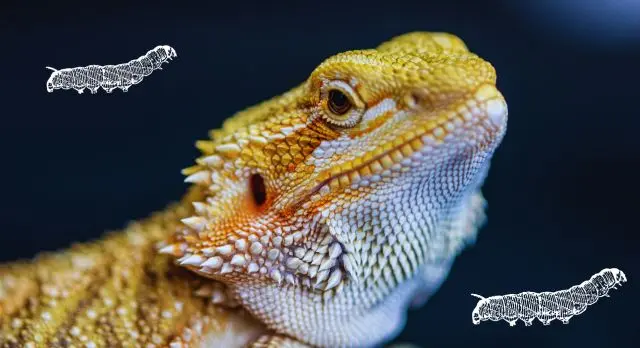Can Bearded Dragons Eat Silkworms? (Simple Answered)
Yes, bearded dragons can eat silkworms. Silkworms are a nutritious source of high-quality protein with moderate fat content, making them a suitable addition to their diet. However, it’s crucial to provide calcium supplementation due to the less-than-ideal calcium-to-phosphorus ratio in silkworms.
Bearded dragons are fascinating reptiles known for their diverse diet. While they primarily consume insects and greens, their dietary options often raise questions among reptile enthusiasts. One common query is, “Can bearded dragons eat silkworms?”
In this comprehensive guide, we’ll explore the nutritional value of silkworms, their benefits and potential drawbacks, and how to incorporate them into your bearded dragon’s diet.

Can Bearded Dragons Like to Eat Silkworms in their Diet?
Absolutely, bearded dragons can like to eat silkworms as part of their diet. Silkworms are a nutritious food source, rich in protein and low in fat, which is ideal for the growth and well-being of your scaly companion. They can be a tasty treat for both young and adult bearded dragons.
But, make sure not to give them too many silkworms. Silkworms are good, but bearded dragons need different foods to stay healthy. It’s important to feed them a mix of insects, leafy greens, and veggies for their best health.
For young bearded dragons, it’s essential to choose the right-sized silkworms to prevent any choking hazards. As they grow, you can adjust the size of the silkworms accordingly.
Benefits of Feeding Silkworms to Bearded Dragons
- High-Quality Protein
Protein is a crucial component of a bearded dragon’s diet. Silkworms provide a high-quality source of protein, promoting healthy growth and muscle development.
- Low in Fat
Bearded dragons require a diet that is low in fat to prevent obesity and related health issues. Silkworms fit the bill with their moderate fat content.
- Calcium and Phosphorus
Silkworms contain both calcium and phosphorus. However, the calcium-to-phosphorus ratio is not ideal. To ensure a balanced diet, consider dusting the silkworms with a calcium supplement.
- Hydration
With a moisture content of 75%, silkworms can contribute to your bearded dragon’s hydration, especially if they are not enthusiastic drinkers.
- Variety in Diet
Offering silkworms can add variety to your bearded dragon’s diet, making mealtime more interesting and potentially helping to prevent dietary boredom.
Potential Drawbacks of Feeding Silkworms
While silkworms offer numerous benefits, there are some potential drawbacks to consider:
- High Cost
Silkworms can be more expensive compared to other feeder insects. This cost factor might be a consideration for some reptile owners.
- Calcium-Phosphorus Ratio
As mentioned earlier, silkworms have a higher phosphorus content compared to calcium. To maintain a balanced diet, you should provide calcium supplements.
- Choking Hazard
If the silkworms are too large or not appropriately sized for your bearded dragon, they can pose a choking hazard. Always choose the right-sized silkworms for your pet.
Related guide – Are silkworms good for leopard geckos?
How to Feed Silkworms to Bearded Dragons?
Feeding silkworms to your bearded dragon is relatively straightforward:
- Size Matters: Ensure the silkworms are an appropriate size for your dragon’s age and size. For young dragons, opt for smaller silkworms to avoid choking hazards.
- Gut Loading: Before feeding, “gut load” the silkworms by providing them with nutritious greens, such as kale or carrots. This enhances their nutritional value for your dragon.
- Dusting: To balance the calcium-phosphorus ratio, dust the silkworms with a calcium supplement before serving.
- Moderation: Silkworms should be part of a varied diet. Alternate them with other insects, such as crickets, mealworms, and dubia roaches, along with vegetables and leafy greens.
- Observe Your Dragon: Pay attention to how your bearded dragon responds to silkworms. If any digestive issues or adverse reactions occur, consult with a reptile veterinarian.
Read more – What do silkworm like to eat?
FAQs
Is it okay for bearded dragons to have silkworms every day?
It’s not recommended to feed bearded dragons silkworms every day because they need a varied diet for their best health.
How many silkworms can a bearded dragon have?
The number of silkworms a bearded dragon can eat depends on its age, but a general guideline is to offer about 2-5 silkworms for young dragons and slightly more for adults in a single feeding.
Can little bearded dragons have silkworms?
Young bearded dragons can have silkworms as part of their diet, but it’s essential to provide them in an appropriate size to avoid choking hazards.
Key Takeaways
- Silkworms are a nutritionally rich food source for bearded dragons, offering high-quality protein and moderate fat content.
- Their calcium-to-phosphorus ratio is not ideal, so supplementation is necessary for a balanced diet.
- Silkworms can add variety to your dragon’s diet and may be useful for hydration.
- Always choose silkworms of an appropriate size to avoid choking hazards.
- Monitor your bearded dragon’s response to silkworms and consult a vet if you have any concerns.
In summary, giving your bearded dragon a few silkworms from time to time can be a good idea. Silkworms offer a special kind of food that’s healthy for your pet and can make mealtime more interesting. Just make sure to take care of your dragon properly and pay attention to their diet. So, don’t hesitate to share these nutritious and yummy bugs with your scaly buddy!
